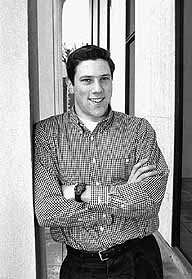Princeton Weekly Bulletin April 27, 1998
Independent major needs to think ahead
By Caroline Moseley
Think ahead." That's the advice independent major Mark Ellis '99 offers students who, like him, have academic interests that cannot be pursued within an existing department at Princeton.
|
|
|
|
|
While it is "very possible" to craft an independent concentration, says Ellis, "It takes planning and creativity."
The first stop for a would-be independent concentrator, he says, is Associate Dean of the College Hank Dobin, who acts as departmental representative for independent concentrators.
Independent concentrators must submit a coherent course of
study, with plans for junior and senior independent work. All
University writing, language and distribution requirements must be
fulfilled as well, and the proposal must have the support
of at least two faculty members.
Work in two fields
According to Dobin, "Independent concentrations tend to be interdisciplinary, typically combining work in two fields--such as Mark's work in politics and psychology." That means advisers tend to come from two departments, Dobin points out; an independent concentrator requires "the enthusiastic support of two faculty members who agree to supervise independent work."
Ellis was attracted to political psychology because "It can raise and address questions in important ways. For example, when studying race relations or ethnic conflicts, psychology can explain why stereotypes and group hostilities are so widespread and difficult to change." In addition, he says, "Political psychology concerns issues that are relevant at all levels of governance all over the world."
Ellis began thinking about political psychology the summer after his freshman year, when he interned in Washington, D.C., for the House Committee on Government Reform and Oversight. "It was interesting to observe people and to wonder what their motivations were for being public officials and holding their particular positions," he remembers.
Back on campus, he talked to "professors who had done work on motivation," among them Professor of Politics Fred Greenstein, who studies presidential administrations; Professor of Near Eastern Studies Norman Itzkowitz, who has written psycho-biographies of Kemal Ataturk and Richard Nixon; and Professor of Psychology John Darley, who studies the connection between the relationship among individuals in a group and the actions of individuals in those groups.
Not just a whim
In May of his sophomore year, Ellis submitted his proposal for an independent concentration, and "Dean Dobin made sure this wasn't just a whim." Ellis had to explain that, while both the Politics and Psychology departments offer many relevant courses, to major in either "would require me to take as many as three or four courses that would not be germane to my area of interest." For example, he says, "Politics majors must take six to eight politics courses," whereas the course roster he selected for himself includes only four politics courses, the rest being in psychology, sociology or the Woodrow Wilson School.
Given the limited number of courses a student can take per semester, and given that Ellis, a trumpeter, is also earning a certificate in music performance that requires six courses, the independent major was appealing.
The courses Ellis proposed for his junior and senior year include The Presidency and Executive Power (Politics); Elites, Leadership and Society (Sociology); Group Processes and Intergroup Relations (Psychology); Presidential Leadership and Public Policy (Woodrow Wilson School); and Studies in Biography (Near Eastern Studies). Not to mention Tonal Syntax and a performance course in Chamber Music. Darley and Greenstein are his advisers.
Psychology of leaders
Intrigued by the character traits and motives that influence people to become public officials or even heads of state, Ellis is particularly interested in "the psychology of leaders, whether past or present, and how they assert their control over particular societies."
His first junior paper, "Is Saddam Hussein a Sacred King?" explored the motivations behind Saddam Hussein's leadership style. "Saddam Hussein doesn't call himself a king," says Ellis, "but he has traced his family tree directly to Mohammed, and he claims Mohammed has sent him to unite all Arabs under one pan-Arab state."
This semester's junior paper will be on Allen Dulles '16, "the father of the U.S. intelligence community, who was instrumental in establishing the Central Intelligence Agency in 1951 and was its director from 1953 to 1961." Ellis, who worked in the office of the inspector general of the CIA last summer, is anxious to "explore Dulles's motivation to devote his life to espionage, to have all his actions secret and accomplishments largely unknown."
For his senior thesis, Ellis plans "to explore the impact of the Dulles brothers' sibling relationship on American foreign policy of the 1950s." Ellis's extracurricular activities include playing trumpet in the University Orchestra, speedskating, serving as a member of the Student Volunteers Council board and advising freshmen as an RA in Forbes College. He is also a member of the Student Advisory Committee, which includes "students from different universities in New Jersey who address student issues debated in the state legislature and lobby for student interests."
What are the positives?
What are the positives of the independent major?
"You get to know a handful of professors on a much more personal level than you would otherwise," says Ellis. "You have a lot of freedom in course selection because there aren't so many departmental regulations--you're studying exactly what you want to study."
He notes that there are five other independent majors this year: seniors Taleeb Noormohamed, majoring in Islamic culture and civilization, and Richard McCabe, majoring in world order studies; and juniors Mike Hehir (bioethics), Reena Raman (neuroscience) and Travis Johnson (philosophy, politics and economics), who is studying this year at Oxford.
"There's nothing you can do as a member of a department that you can't do as an independent major," says Ellis. "Except maybe go to a departmental Christmas party."
